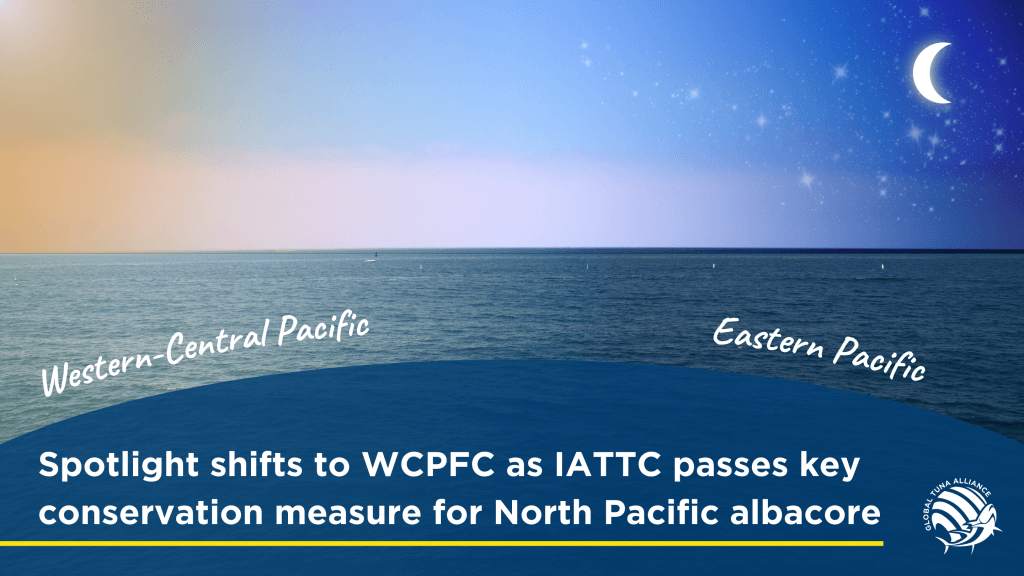
The Global Tuna Alliance (GTA), a pre-competitive association of 49 retailers and seafood supply chain companies with a shared interest in sustainable tuna, described the progress made at last week’s Inter-American Tropical Tuna Commission (IATTC) meeting as “groundbreaking” across many of the areas the market was looking to see improvements in, though efforts to improve the transparency of the industry fell short once again.
They specifically highlighted a proposal aimed at advancing the responsible management of the North Pacific (NP) albacore stock; one of the key focuses of their pre-meeting campaign. The adoption of an amendment to the NP albacore harvest strategy, sets the stage for an unprecedented Pacific-wide harvest strategy, if the Western-Central Pacific Fisheries Commission (WCPFC) signs off on a similar proposal at their meeting in December.
There was an air of optimism heading into the 101st Session of the IATTC which this year took place in Victoria, Canada. The adoption of a Management Strategy Evaluation (MSE) last year for NP albacore which enabled scientists to simulate the effectiveness of various fishing controls, facilitated the adoption of harvest control rules (HCRs) this time around. HCRs set predetermined catch or fishing effort limits, ensuring that the amount of tuna taken out of the ocean doesn’t reach unsustainable levels. The joint proposal from Canada, Japan and the United States to include HCRs in the harvest strategy passed unanimously on Wednesday.
The spotlight will now be focused on WCPFC’s meeting in December. Earlier this year, the WCPFC’s northern committee produced an amendment to their own NP albacore harvest strategy which included HCRs. If adopted in December by the Commission, the two Regional Fisheries Management Organizations (RFMOs) will have aligned harvest strategies for the very first time.
Explaining the significance, Albert Arthur, the GTA’s Director of Outreach and Engagement said: “This joined up approach that we’re seeing from these two RFMOs is exciting. It opens the door to further collaboration to ensure the maximum environmental performance of tuna fisheries, not just in the east or the west, but across the entirety of the Pacific Ocean.
“The North Pacific albacore resolution will surely turn the heads of many seafood retailers and suppliers who will feel increasingly confident sourcing their tuna from a region demonstrating their commitment to the responsible management and conservation of key stocks.”
In spite of the progress on NP albacore, the IATTC missed out on an opportunity to implement fishing controls across the whole of the Pacific for the South Pacific (SP) albacore stock, when a proposal by Ecuador to prevent producing countries increasing the number of active longline vessels was withdrawn.
“It is a little bit of a case of two steps forward and one step back for albacore tuna in the Pacific with this outcome. While the proposal would have been a sound starting point from which to develop a harvest strategy for the SP albacore stock, the GTA are not too concerned, with the overall trajectory continuing in the right direction.” Albert Arthur added.
A number of NGOs present at the meeting, such as the Pew Charitable Trusts recognized the growing power of direct market engagement in the RFMO sphere. Commenting on the advocacy of the market, Esther Wozniak, Manager, International Fisheries, from Pew said: “Adoption of this and other new policies in the Eastern Pacific was aided by the participation of members of the seafood supply chain who have embraced their role in the conservation and management of IATTC species. This demonstrates that the growing demand for sustainable seafood is leading to positive change in the marketplace, and we look forward to more involvement from market representatives at upcoming regional fisheries management organization meetings.”
In a sign of the increasing attention paid by the seafood market to the activities of RFMOs, the GTA were joined by representatives from three of their Partners: Stacy Shultz from Fortune Fish & Gourmet, Peter Adame from Lusamerica Foods and Hamish Walker from the Seattle Fish Company.
Peter Adame, Director of Communications and Sustainability at Lusamerica Foods, said:
“It was an honor to be a part of the Global Tuna Alliance’s delegation for the 101st session. Highlighting Lusamerica’s priorities on how effective fisheries management impacts our business relationships is a unique perspective. Fishing is ultimately a business and the largest companies we distribute to have sustainability goals that support the sustainability of these species.
“Since the USA is a heavy importer of seafood, our dollars can help drive positive influence internationally as effective fisheries management is key for making progress both environmentally and economically.
It’s encouraging to see proposals pass during the 101st session to support tropical tuna populations, protect silky sharks, effectively monitor vessels, and address climate change.
As well as the conservation measures for albacore, the GTA were also left impressed by a swathe of other measures adopted by IATTC, many of which aligned with their own position statement.
Albert Arthur said: “It was great to see collaboration from a number of nations on a resolution which sets a timeline for implementing biodegradable FADs as well as prohibiting the use of mesh and entangling materials which causes harm to the marine environment.”
However, the GTA were disappointed when a proposal by Ecuador to improve observer coverage onboard longline vessels of 20 meters or more from 5% to 100% by 2027 failed, for a second year running. The GTA and PEW had issued a public statement to the floor endorsing and supporting the proposal.
Reflecting on the outcome of this proposal, Albert Arthur said: “We were disappointed by the continued opposition from a small group of Asian countries to improve observer coverage onboard longline vessels.
“Our Partners are committed to ensuring their supply chains are transparent, avoiding seafood products from Illegal, Unreported and Unregulated (IUU) fishing. Without comprehensive observer coverage making sure that conservation measures are enforced, they may choose to source their tuna elsewhere.”